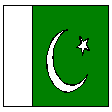
PAKISTAN MISSION TO THE
UNITED NATIONS, NEW YORK
FIRST COMMITTEE
STATEMENT BY THE PERMANENT REPRESENTATIVE OF PAKISTAN TO THE UNITED NATIONS OFFICE IN GENEVA, IN THE FIRST COMMITTEE OF THE 50TH SESSION OF THE UNGA ON THE "ESTABLISHMENT OF A NUCLEAR-WEAPON-FREE ZONE IN SOUTH ASIA." 7 NOVEMBER 1995
Mr. Chairman,
I have asked for the floor to introduce the draft resolution in document A/C.1/50/L.6 entitled "Establishment of a Nuclear-Weapon-Free Zone in South Asia".
In 1972, when inaugurating Pakistan's first nuclear power reactor in Karachi, the former Prime Minister of Pakistan, Mr. Zulfiqar Ali Bhutto, advanced the proposal for a nuclear weapon free zone in South Asia. After the Pokharan nuclear explosion of May 1974, Pakistan reiterated this proposal. We were gratified that the UN General Assembly endorsed the creation of such a nuclear weapon free zone in South Asia in its Resolution 3265 B (XXIX) of 9 December 1974. This endorsement has been reaffirmed in the UN General Assembly by ever-increasing votes each year for the past 20 years.
Since the 1978 first Special Session of the UN General Assembly on Disarmament, the creation of nuclear weapon free zones is considered as an important component of the world community's endeavor to promote the twin goals of nuclear disarmament and nuclear non-proliferation. It is ironic that while considerable progress has been made towards the creation of nuclear weapon free zones in various other parts of the world, there has been no significant progress towards the Assembly's repeatedly affirmed objective of a nuclear weapon free zone in South Asia.
Pakistan warmly welcomes the consolidation of the Treaty of Tlatelolco in Latin America and the adoption by the Organization of African Unity (OAU) of the Pelandaba Treaty on the establishment of a Nuclear Weapon Free Zone in Africa. With the full implementation of the Raratonga Treaty in the South Pacific and the proposed creation of nuclear free "peace zones" in the South Atlantic and the Indian Ocean, the world community may well succeed in eliminating the production and the presence of nuclear weapons in the entire southern hemisphere.
Pakistan remains hopeful that a nuclear weapon free zone will, one day, become a reality in South Asia. All the states of South Asia have made unilateral declarations, at the highest levels, pledging themselves not to acquire, develop or manufacture nuclear weapons. What is needed is a sincere effort to transform these unilateral pledges into an effective and acceptable multilateral non-proliferation regime, as has been accomplished in other parts of the world.
The draft resolution in document A/C.1/50/L.6 is designed to reaffirm the international community's firm support to the objective of a nuclear weapon free zone in South Asia. This objective is all the more urgent in view of the tensions and conflicts that afflict this region where one-fifth of humanity lives.
Various endeavors have been made over the course of the past several years to advance this objective - including proposals for five-power and nine-nation multilateral talks on non-proliferation, security and related issues. Pakistan will continue to work for agreement on a practical modality which can promote resolution of disputes, nuclear and military restraint and the goal of non-proliferation in South Asian region.
It is the sincere hope of the Pakistan delegation that the draft resolution in document A/C.1/50/L.6 will be adopted with the widest possible majority by the Committee and the UN General Assembly.
I thank you, Mr. Chairman.
For further information please contact:
Pakistan Mission, 8 East 65th Street, New York NY 10021.
Tel: (212) 879.8600 or E-Mail: pakistan@undp.org
|
NEWSLETTER
|
| Join the GlobalSecurity.org mailing list |
|
|
|

